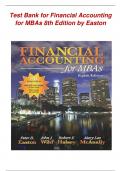Exam (elaborations)
TEST BANK for Financial Accounting for MBAs 8th Edition by Peter Easton & John Wild contains verified questions and answers graded A+
TEST BANK for Financial Accounting for MBAs 8th Edition by Peter Easton & John Wild contains verified questions and answers graded A+
[Show more]




